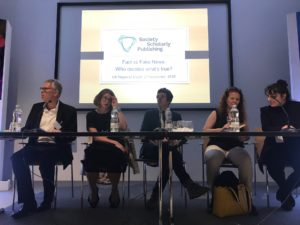 Local committee volunteer Vanessa Fairhurst reports on our latest regional event in London
Local committee volunteer Vanessa Fairhurst reports on our latest regional event in London
It’s hard now for most of us to conceive of life without the internet, despite the fact that this nebulous online world has only really come about in the last 20 years. With the click of a button you can hold a meeting with your colleague on the other side of the world, pay for a product with your fingerprint, swipe right to find your next love, turn your cat into a social media star, and find the answer to almost any question ever asked within seconds.
However, in a world where we have greater access to information than ever before, from an ever-increasing range of different sources, how do we find the truth amongst all the noise?
What is the role of the media, academia, research, and science when people increasingly turn their backs on experts and traditional information sources? How do we avoid falling into the traps of misinformation echo-chambers, confirmation bias, and algorithm driven narratives? What will the political, economic, social, and environmental consequences be if we don’t?
On the 27th September 2018 we brought together a panel of experts from across the industry to discuss these issues at the SSP UK Event, ‘Facts vs. Fake News: Who Decides What is True?’ hosted at Springer Nature’s London campus.
Chaired by David Bull, (Vice President for Business, Economics, Political Science & Law publishing at Springer Nature), the panel included The Conversation’s Michael Parker, Jennifer Pybus, a lecturer at King’s College London, Lusiné Mehrabyan from FactMata, and Heather Staines, Director of Partnerships at Hypothes.is. The panel discussed innovative ways in which to address the issue of fake news, along with the challenges it presents.
Independent, non-profit news organisation, The Conversation, aims to re-build trust in journalism by sourcing their articles from the academic community. Michael Parker explained how the content is written by academics and researchers with proven subject knowledge expertise, a team of professional editors then work with the authors to help them share their knowledge in a timely and easy to understand manner. Providing current news, in an accessible way, direct from the experts, means that the public can trust in the accuracy of the reporting. Information is never hidden behind a paywall and it’s free to read, share, or republish.
Contributing author of ‘Trump’s Media War’, Jennifer Pybus, then discussed the complexity of online political and advertising campaigns. Jennifer gave some stark statistics about how we engage with the internet, in the UK spending an average of around 6 hours a day online across devices. Clearly this presents a huge opportunity for marketing almost anything to a mass, guaranteed, audience. Jennifer went onto explain that data collected about us, is then used, not only in deciding where best to place ads, but also what content to put in them, and the way in which to best display it. This is particularly pertinent when considering political campaigns and the influencing of voter behaviour, is social media now the key to winning an election?
Speaking next, Lusiné Mehrabyan from FactMata thankfully offered us some hope in ways to build a better media eco-system via community-driven AI. The organisation’s mission is to protect people, advertisers, publishers and other businesses from deceptive or misleading content online. FactMata’s technology provides a quality and credibility score to any piece of content on the web, making it easier to identify hate speech, propaganda, fake news and clickbait. In order to ensure the algorithms work, they also make use of communities and experts who provide their own feedback. Together with Hypothe.is they are part of the Credibility Coalition, constructing interdisciplinary frameworks for assessing information quality online.
Heather Staines talked more about this and the wider work of Hypothe.is where annotation is used in fact-checking. Using annotations allows for public note taking and critique on top of news, blogs, scientific articles, books, legislation and more. A particularly striking example Heather gave of how it works in practise is Climate Feedback, a worldwide network of scientists who help to sort fact from fiction in climate change reporting by using the Hypothe.is client to review articles and score them for credibility.
The panel gave the audience a lot of food for thought as was evidenced by the questions and discussions which continued over drinks and nibbles afterwards. Thanks goes to our sponsors Ingenta, Cabells, Atypon, and Editage who enabled this free-to-attend event to happen and special thanks to Springer Nature for proving an excellent venue.
Please look out for future events via the SSP website and Twitter page.


Join the Conversation
You must be logged in to post a comment.